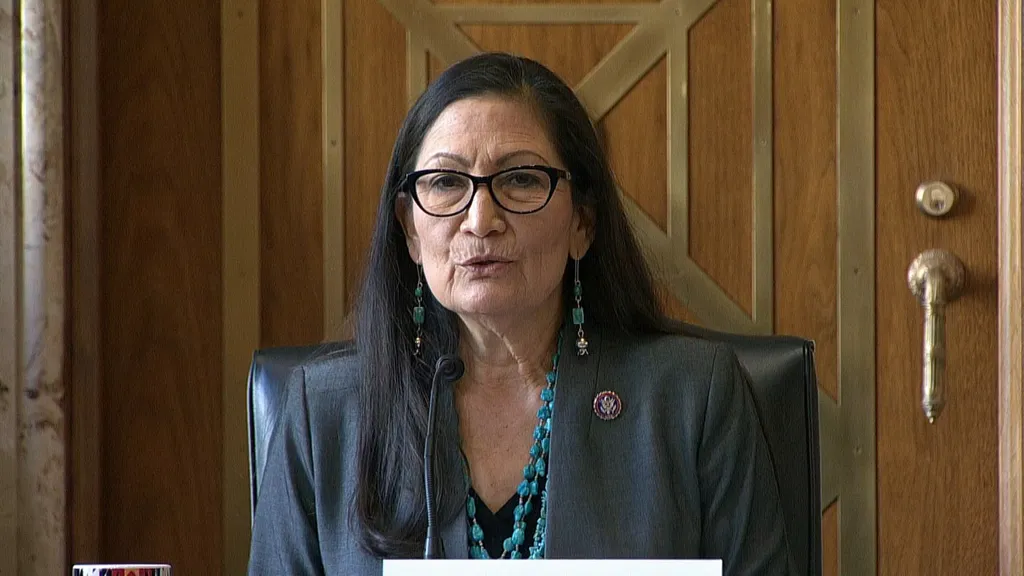
- Details
- By Jenna Kunze
WASHINGTON — The Senate Committee on Energy and Natural Resources will hold a business meeting at 10 a.m. this Thursday, March 4, to consider the nomination of Rep. Deb Haaland (Laguna Pueblo) to Secretary of the Interior Department.
The 20-member bipartisan Senate committee can make one of four moves on Thursday: it may report the nomination to the Senate favorably, unfavorably, or without recommendation, or it may choose to take no action at all. According to a procedure guide for members of Congress, Haaland will need a majority of favorable votes supporting her nomination in order for it to pass. Without a favorable majority — and even if there is an unfavorable majority — the vote will go to the Senate floor.
If confirmed, Haaland will make history as the first Native American to serve in a cabinet position.
The Thursday meeting comes a week after Senators from the energy committee questioned Haaland over two days of hearings.
Since, key lawmakers have publicly announced whether they intend to confirm or deny President Joe Biden’s pick to head the Interior Department.
Energy committee chair, Sen. Joe Machin of West Virginia, announced last week his intention to support Haaland because of “her strong commitment to bipartisanship.”
“Her colleagues on both sides of the aisle, including Republican Congressman Don Young from the energy rich state of Alaska, spoke to their productive working relationship, her bipartisan accomplishments and sincere willingness to work collaboratively on important issues,” the senator wrote in a statement:
But several Republican Senators indicated that Haaland’s “radical views” — based off a repeatedly quoted statement she told The Guardian in 2019 that she is “wholeheartedly against fracking and drilling on public lands” — stood in contrast with their western states’ extractive industries.
During the hearing, Washington Sen. Maria Cantwell described Haaland's nomination as a “proxy fight for the future of fossil fuels.”
One known dissenting lawmaker is Sen. Steve Daines of Montana, who posted his statement on Twitter, stating that he will vote against Haaland’s nomination because “she’s a hardline ideologue with radical views out of touch with Montana and the West.”
Indian Country has banded together with sweeping support for Rep. Haaland.
“In the more than 200-year history of this country’s government, there has never been a seat at the president’s cabinet table for Indigenous peoples of this country,” a group letter signed by 127 Alaska Native women wrote. “For the first time, this long overdue and historic appointment is possible.”
More Stories Like This
Native News Weekly (August 25, 2024): D.C. BriefsNavajo Nation Mourns the Passing of Former Vice President Rex Lee Jim
Deb Haaland Earns Endorsement From Communications Workers of America Local 7076
University Soccer Standout Leads by Example
Two Native Americans Named to Democratic Congressional Campaign Committee's“Red to Blue” Program
Help us defend tribal sovereignty.
At Native News Online, our mission is rooted in telling the stories that strengthen sovereignty and uplift Indigenous voices — not just at year’s end, but every single day.
Because of your generosity last year, we were able to keep our reporters on the ground in tribal communities, at national gatherings and in the halls of Congress — covering the issues that matter most to Indian Country: sovereignty, culture, education, health and economic opportunity.
That support sustained us through a tough year in 2025. Now, as we look to the year ahead, we need your help right now to ensure warrior journalism remains strong — reporting that defends tribal sovereignty, amplifies Native truth, and holds power accountable.
 The stakes couldn't be higher. Your support keeps Native voices heard, Native stories told and Native sovereignty defended.
The stakes couldn't be higher. Your support keeps Native voices heard, Native stories told and Native sovereignty defended.
Stand with Warrior Journalism today.
Levi Rickert (Potawatomi), Editor & Publisher

